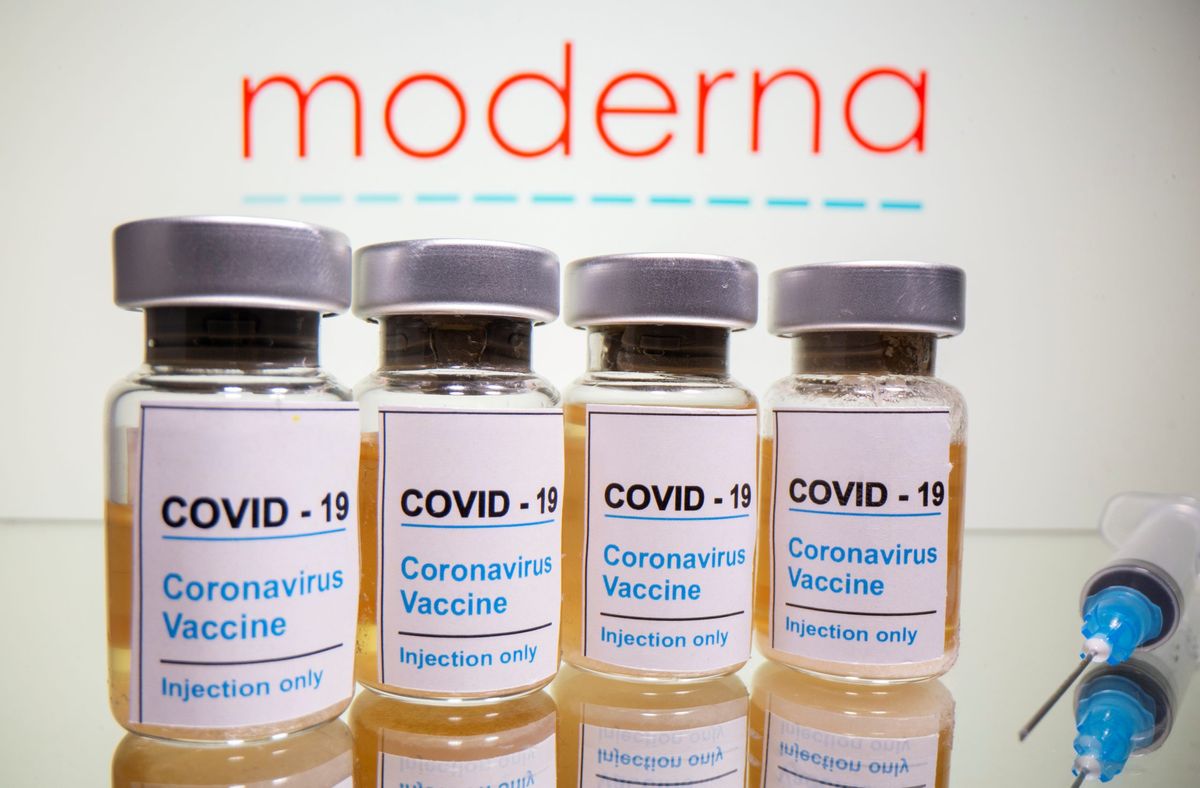Moderna fuels vaccine hype with a second dose of positive trial results

A few minutes every morning is all you need.
Stay up to date on the world's Headlines and Human Stories. It's fun, it's factual, it's fluff-free.
Moderna was one of the first US companies to begin conducting human trials for a COVID-19 vaccine. The company began late-stage testing with up to 30,000 participants in July.
American biotechnology company Moderna Inc. has added to the recent wave of positive coronavirus vaccine news by announcing that its vaccine is reportedly 94.5% effective.
Similar to the vaccine announced by Pfizer, Inc., Moderna’s development relies on messenger RNA technology, which, having never been used to develop a vaccine before, would be a first.
A successful vaccine would also be a first for Moderna. The company, founded in Cambridge, Massachusetts in 2010, has never before brought a product to market.
Nonetheless, 2020 has seen dramatic growth for Moderna and its executives. With billions of dollars in funding and vaccine orders from the United States government, Moderna has grown from being a relatively smaller player in the pharmaceutical industry to one promising to bring at least a partial end to the pandemic.
Vaccine development
Moderna was one of the first US companies to begin conducting human trials for a COVID-19 vaccine. The company began late-stage testing with up to 30,000 participants in July.
Moderna’s vaccine is based on mRNA – messenger RNA – and works by introducing a small part of the coronavirus’ genetic code into the body, though not the whole virus, which trains the immune system to produce antibodies and T-cells to fight off the virus.
Though this method is similar to the one used by Pfizer’s vaccine, Moderna’s possesses some other advantages. Unlike Pfizer’s, Moderna reportedly has data showing that its vaccine can be kept refrigerated for some 30 days. That overcomes a huge hurdle in getting the vaccine distributed around the world effectively, particularly to countries with warm climates.
Moderna also reported even better results than Pfizer in its vaccine’s late-stage trials.
Moderna’s trial data displayed an efficacy rate of 94.5% in preventing COVID-19 infection. The US Food and Drug Administration’s bar for achieving emergency approval is around 50% – significantly lower than the results seen by both Moderna and Pfizer. Moderna’s trials also reported no major side effects from its vaccine.
The medical community, both inside and outside of Moderna, has been largely overjoyed by the results. Tal Zaks, chief medical officer at Moderna, told the BBC that “the overall effectiveness has been remarkable … it’s a great day.”
Dr. Anthony Fauci, the director of the National Institute of Allergy and Infectious Diseases, said he would have been “satisfied with a 75% effective vaccine,” but “94.5% is very impressive.”
Market hype
Despite the good news coming from Moderna, markets reacted more modestly than they had to Pifzer’s earlier announcement of its own positive vaccine trial results.
In the wake of Pfizer’s announcement that its vaccine, developed with German company BioNTech SE, had displayed an efficacy rate of some 90%, global markets experienced a big surge.
And while the Dow Jones and S&P 500 both reached record highs following Moderna’s announcement, the immediate impact was more muted, having done little more than “reconfirm the news from Pifzer,” according to Bloomberg, which, of course, announced its positive results first.
But the announcement of a 94.5% effective vaccine serves as yet another piece of good news in 2020 for Moderna and its executives.
Under “Operation Warp Speed,” Moderna has received some US$955 million in funding for research and development, unlike Pfizer and BioNTech, whose funding was predominantly provided by the German government.
Before the onset of the pandemic, Moderna was valued at around US$6 billion, having been founded only a short-time ago in 2010.
This year alone, Moderna’s stock has risen by more than 400%, fueled by contracts with the US government that fund research and development as well as orders for its eventual vaccine when developed. Moderna’s market cap has now reached some US$38.62 billion.
The positive news surrounding vaccine development comes at a time when the pandemic continues to afflict the US, forcing some states to take more stringent measures.
Following the announcement of a 94.5% effective vaccine, Moderna chief executive officer Stephane Bancel’s net worth jumped by some US$200 million and board members of the biotechnology company also saw the values of their holdings in the company rocket by hundreds of millions of dollars.
According to data provided by Bloomberg, Bancel has sold stock in Moderna worth more than US$41 million this year alone, raising similar concerns about stock sales that have surrounded Pfizer CEO Albert Bourla’s multimillion dollar stock sales in the wake of positive vaccine news.
In the three months preceding September, before data from these late-stage trials had been compiled, Forbes analysis showed that there had been some 76 sales by MRNA “insiders” amounting to some 12,188,398 shares, a rapid offloading of hundreds of millions of dollars worth of vaccine-developer shares.
Pharmaceutical executives have defended themselves against accusations of “insider trading” by noting that these sales were long in the making. Many executives, including Moderna’s, have adopted 10b5-1 plans that pre-schedule stock sales long in advance, before positive news and the subsequent impact on stock values can be estimated.
Though these plans may rebuff accusations of insider trading, they certainly create some bad optics.
Pharmaceutical executives have brought home millions of dollars via stock sales during the height of the pandemic, mirroring a broader pattern of executives across a variety of industries profiting at a time of disproportionate economic suffering.
Have a tip or story? Get in touch with our reporters at tips@themilsource.com




Comments ()